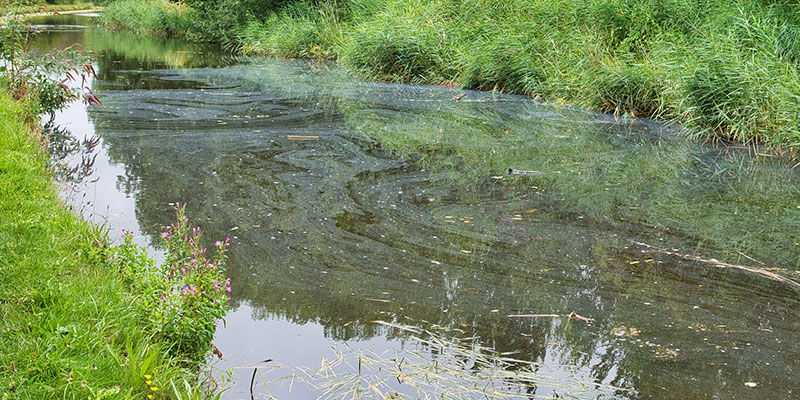A dirty film appears on the surface of the Leeds and Liverpool Canal in Lancashire, England. In 2021, U.K. water companies admitted discharging raw sewage into British rivers, estuaries, and seas approximately 1,000 times per day.
While sewage pollution is at a crisis point in the UK, new treatment technologies can turn that around
Pollution from sewage in the United Kingdom has become extreme and is made worse by climate change and the sheer scale of the problem.
Discharges are permitted into U.K. water bodies when stormwater threatens to overwhelm water systems. Without the releases, water systems could overflow and leak sewage into streets and inhabited areas. Yet too-frequent discharges can significantly affect water quality in the receiving water bodies.
In 2021, U.K. water companies admitted discharging raw sewage into British rivers, estuaries, and seas approximately 1,000 times per day, a total of 372,000 discharges for the year. Sewage flowed into U.K. rivers for 2.6 million hours last year, according to the water companies’ own data.
A new plan announced by the environment secretary would require water companies to spend £56 billion over 25 years on a storm sewage discharge reduction program. It would increase network and wastewater treatment capacity, but the plan has been widely criticized.
A Different Kind of Privatization
Many place blame on the privatization of water infrastructure in the 1980s, which made it harder for individual entities in an already fragmented system to raise money for maintenance and upgrades. Decades later, consumers overpay and pollution of water bodies is a national scandal.
However, today’s public-private partnerships (PPPs) have been rebooted as performance-based contracts that allow public agencies to leverage the resources of specialists in the field while unburdening themselves of risk. An updated PPP offers the best of both worlds, public and private. While the PPP space initially gained something of a Wild West reputation in the early years, today governments worldwide recognize the benefits of PPP structures such as build-own-operate (BOO) and build-own-operate-transfer (BOOT) agreements.
A public agency can receive infrastructure from a private entity with no upfront investment under these contracts. Quality and price are predetermined, reducing uncertainty and fostering public trust.
Fluence’s BOO and BOOT Offerings
Fluence’s Water Management Services utilizes these flexible financing arrangements and contractually guarantee water quality as a condition of payment. Customers pay for only the water services, while Fluence takes on the cost and responsibility of building, operating, and maintaining the plant.
Fluence offers Aspiral™ modular plants that can be deployed much more quickly than large-scale wastewater infrastructure, and our membrane aerated biofilm reactor (MABR) technology significantly improves the effluent quality with minimal physical and carbon footprint.
While nobody likes a sewage pollution crisis, rebuilding with newer technologies and more advantageous strategies offers an opportunity to revolutionize economies and ecologies. Start fresh, and contact Fluence to learn more about our flexible financing options and proven wastewater treatment technologies.

